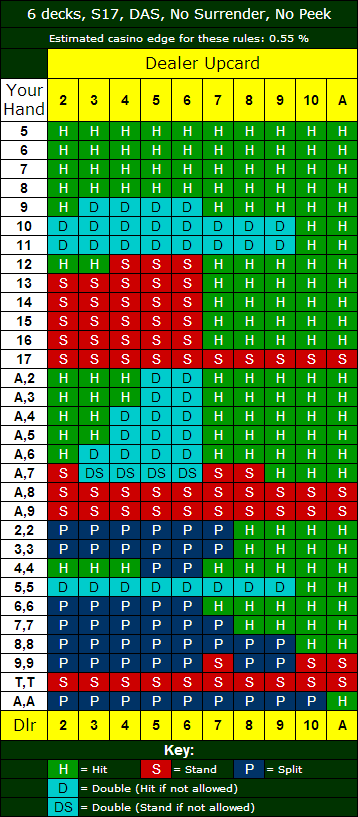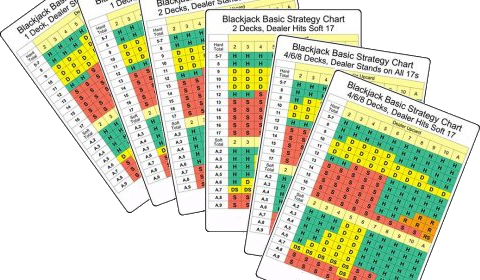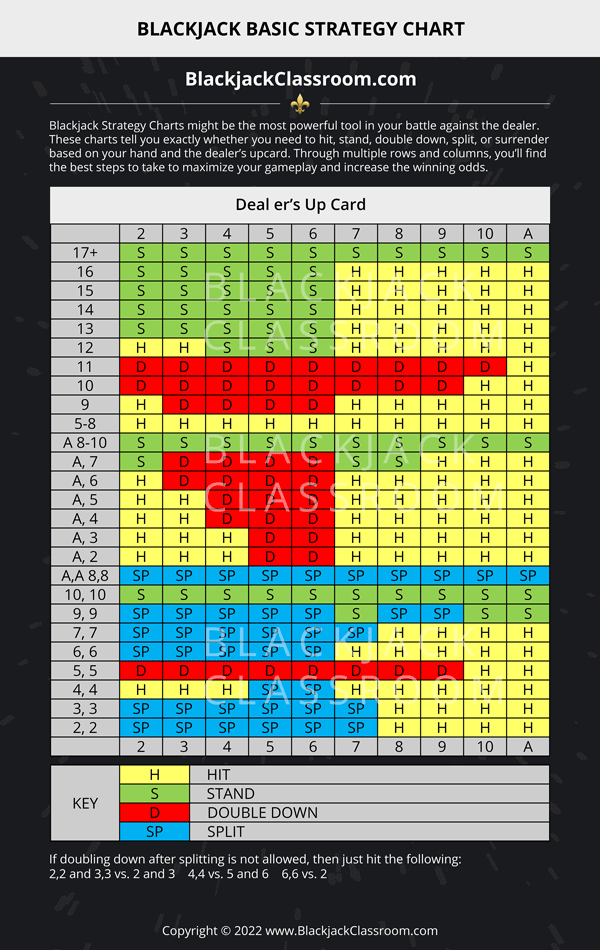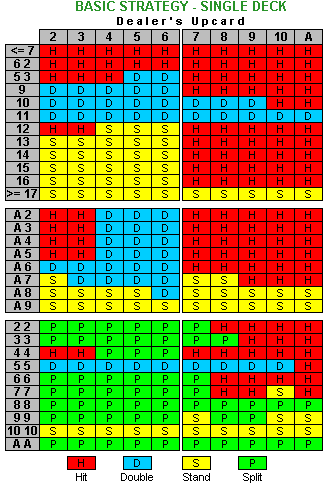A Basic Strategy For Blackjack Chart
If you’re going to playblackjack in a casino for the first time, you should learn how to use a basic blackjack strategy chart.
Since blackjack is a game of decisions that matter to the math behind your outcomes, you should learn how to make the decisions which are most likely to result in your winning.
(The reason is that some players find it easier to learn the basic strategy with a blackjack strategy chart.) The dealer’s upcard (2 though Ace) appears along the top of the chart and the player’s hand can be found down the first column (grouped in order by Hard Hands, Soft Hands, followed by Pairs).
- Chart for Blackjack Play. Many blackjack players are intimidated or scared of the idea of memorizing basic strategy. I’ve got two pieces of great news if you fall into this category and / or haven’t tried to learn basic strategy yet. The first piece of good news is you don’t have to memorize the best blackjack strategy in order to use it.
- Blackjack strategy charts are the most popular and effective way to learn basic strategy. The chart contains rules and permutations which can be directly used in any online blackjack game, as well as some land-based casinos.
Experts have put together basic strategy charts to help you do this, but how do you use such a chart?
This post explains it.
What Should Your Blackjack Strategy Be?
Any time you’re playing a casino game, blackjack or otherwise, your goal should be to minimize the casino’s statistical advantage—the house edge. In many casino games, like slot machines, there’s not much you can do to affect the house edge.
But blackjack is different.
If you hit when you should stand or stand when you should hit, you give percentage points back to the house.
If you’re playing badly, you might be facing a 4% edge at blackjack. You might as well playroulette and not have to worry about making decisions at all.
If you’re playing well, though, you might face a house edge of between 0.3% and 1%, which is as low as you’ll see in the casino.
Playing well is the catch, though.
What Is Basic Strategy in Blackjack?
In a gambling situation where you must make a decision, you can measure something called the “expected value” of that decision. Most of the time, the expected value of any bet in a casino is negative, which means that you’ll lose a certain amount of money on that bet on average over time.
In real moneyblackjack, you have various possible scenarios, and the expected value in each of those situations change based on the decisions you make.
Here’s an example:
Suppose you’re dealt a total of 20. If you decide to hit, only one card can improve your hand—an ace.
ANY other card will bust your hand.
The expected value of that decision is terrible when you contrast it with the decision of standing.
It doesn’t even matter what card the dealer has face-up.
But most decisions in blackjack aren’t that simple. That’s where basic strategy comes in.
By running thousands of computer simulations, mathematicians have determined the highest-expected value decision in every possible blackjack situation.
That’s what basic strategy is—the mathematically optimal decision in every blackjack situation.
What Is a Blackjack Strategy Chart and How Do You Use It?
A blackjack hand presents the following information to the player:
- The dealer’s face-up card
- The player’s total

With those two pieces of information, you can create a chart with the dealer’s face-up card across the top and your total along the left-hand side.
Cross-index the 2, and you find the appropriate decision for that situation.
I’m not going to include a complete basic strategy chart in this post, as I’d prefer to use the space for someone else. Instead, I’ll provide a single row of such a chart below. Along the top are the possible dealer up-cards. This is for someone with a hard total of 13:
| 2 | 3 | 4 | 5 | 6 | 7 | 8 | 9 | 10 | A | |
|---|---|---|---|---|---|---|---|---|---|---|
| 13 | S | S | S | S | S | H | H | H | H | H |
This is a pretty easy hand to play, actually. You’ll stand if the dealer has a 2, 3, 4, 5, or 6 showing. If the dealer has a 7 or higher showing, you’ll hit. (That’s what the “S” and the “H” stand for.)
This is, in fact, the correct playing strategy for a hard total of 14 or 15, too.
Soft totals have a different section from the hard listings, and you generally play those hands more aggressively, hitting and doubling down more often.
Here’s the basic strategy chart for a total of soft 13:
| 2 | 3 | 4 | 5 | 6 | 7 | 8 | 9 | 10 | A | |
|---|---|---|---|---|---|---|---|---|---|---|
| 13 | H | H | H | D | D | H | H | H | H | H |
You’ll notice that if the dealer has a 5 or 6 showing, the correct move is to double down. You’ll also notice that under no circumstances will you stand on a soft 13. Since the ace can count as 1 or as 11, it’s impossible to bust this hand, no matter what card you get next.
You can print a basic strategy chart off the internet and consult it at the table, but you can’t use one from your phone. Casinos don’t allow the use of technology while you’re playing their table games.
You can buy a small strategy chart, a blackjack basic strategy card, in most casino gift shops. You’re welcome to use that at the table, too.
I only have one caveat about using a basic strategy chart in a casino at the table. Don’t hold up the game while using the chart. You’ll anger the other players and the dealer. No one wants to wait while you slow down the game agonizing over your decisions.
Your best bet is to memorize a basic strategy chart and play according to the strategy on the one in your mind every time you play.
Will Basic Strategy Make Me a Winner?
Using basic strategy when you playblackjack makes you a winner in my book, but that’s probably not what you meant.
Here’s the truth:
Even if you use perfect basic strategy, the house has a mathematical edge in blackjack. So, if you play long enough, you’ll eventually bet a net loser.
But using basic strategy increases the probability that you’ll have a winning session just by virtue of being the mathematically best way to get the most expected value from every hand.
Blackjack is still a random game, so anything can happen, even if it’s unlikely.
The trick is to make a winning session as likely as possible.
And yes, basic strategy will help you do that.
Even card counters, who do have an edge over the casino, can and do experience long losing streaks that decimate their bankrolls.
The opposite can hold true, too.
Players who play badly can go on winning streaks, too. They’re just less likely to.
When to Hit in Blackjack and When to Stand
You should hit in blackjack when the chart tells you to. Sometimes, you’ll hit when you’re likely to bust just because it’s better than standing in the long. This is usually the case when you have a low total that might bust, but the dealer has a high-point card showing.
For example, if you have a total of 13, you only hit when the dealer has a 7 or higher showing. That’s because the dealer probably has a total of 14 or higher.
Even though you have a chance of busting, you’re still better off hitting and hoping not to bust.
You should stand in blackjack when the chart tells you to.
Generally, you’ll stand when you’re likely to go bust, but you’ll also often stand when the dealer has a good probability of going bust.
This means understanding, in a general sense, what a stiff hand is.
A stiff hand is one with a total of 16 or lower. These are the hands which are too low to win easily but also too high to hit confidently.
If you assume the dealer has a 10 in the hole, you have a good idea of how likely the dealer is to have a stiff hand.
And the dealer doesn’t get to choose whether or not to hit a hard 15 or 16. She must hit anything totaling 16 or less.
This means that sometimes, the best strategy is to hope for the dealer to bust.
How do you know when this is the case?
You follow the basic strategy chart.
Every hand. No exceptions.
Multi-Deck vs. Single Deck Blackjack Strategy
Basic strategy changes slightly based on how many decks are in play, but it only changes for a small percentage of totals and situations. Generally, if you memorize one common basic strategy chart, it’s fine to use it for any blackjack game you play regardless of the number of decks.
The reason the strategy changes is because the probability of getting a card of the same rank increases when you have more decks in play.
For example, in a single deck blackjack game, you’ll surrender or stand with a pair of 7s if the dealer has a 10 showing.
But if you’re playing in a game with multiple decks, you’ll hit because you have a higher probability of getting a 7 and having a total of 21.
Most of the changes are minor, though.
Conclusion
Learning how to use a blackjack basic strategy chart is easy to do. There’s really no excuse for not plugging any leaks in your blackjack game by using basic strategy.
You don’t even have to memorize the basic strategy. Just take a chart to the table with you and consult it when you’re not sure how to play your hand.

Pay no attention to anyone who makes fun of you or disagrees with the decisions on the chart. Most blackjack players don’t play well at all anyway.
Please enable JavaScript to view the comments powered by Disqus.
If you’re going to playblackjack in a casino for the first time, you should learn how to use a basic blackjack strategy chart.
Since blackjack is a game of decisions that matter to the math behind your outcomes, you should learn how to make the decisions which are most likely to result in your winning.
Experts have put together basic strategy charts to help you do this, but how do you use such a chart?
This post explains it.
What Should Your Blackjack Strategy Be?

Any time you’re playing a casino game, blackjack or otherwise, your goal should be to minimize the casino’s statistical advantage—the house edge. In many casino games, like slot machines, there’s not much you can do to affect the house edge.
But blackjack is different.
If you hit when you should stand or stand when you should hit, you give percentage points back to the house.
If you’re playing badly, you might be facing a 4% edge at blackjack. You might as well playroulette and not have to worry about making decisions at all.
If you’re playing well, though, you might face a house edge of between 0.3% and 1%, which is as low as you’ll see in the casino.
Playing well is the catch, though.
What Is Basic Strategy in Blackjack?
In a gambling situation where you must make a decision, you can measure something called the “expected value” of that decision. Most of the time, the expected value of any bet in a casino is negative, which means that you’ll lose a certain amount of money on that bet on average over time.
In real moneyblackjack, you have various possible scenarios, and the expected value in each of those situations change based on the decisions you make.
Here’s an example:
Suppose you’re dealt a total of 20. If you decide to hit, only one card can improve your hand—an ace.
ANY other card will bust your hand.
The expected value of that decision is terrible when you contrast it with the decision of standing.
It doesn’t even matter what card the dealer has face-up.
But most decisions in blackjack aren’t that simple. That’s where basic strategy comes in.
By running thousands of computer simulations, mathematicians have determined the highest-expected value decision in every possible blackjack situation.
That’s what basic strategy is—the mathematically optimal decision in every blackjack situation.
What Is a Blackjack Strategy Chart and How Do You Use It?
A blackjack hand presents the following information to the player:
- The dealer’s face-up card
- The player’s total
With those two pieces of information, you can create a chart with the dealer’s face-up card across the top and your total along the left-hand side.
Cross-index the 2, and you find the appropriate decision for that situation.
I’m not going to include a complete basic strategy chart in this post, as I’d prefer to use the space for someone else. Instead, I’ll provide a single row of such a chart below. Along the top are the possible dealer up-cards. This is for someone with a hard total of 13:
| 2 | 3 | 4 | 5 | 6 | 7 | 8 | 9 | 10 | A | |
|---|---|---|---|---|---|---|---|---|---|---|
| 13 | S | S | S | S | S | H | H | H | H | H |
This is a pretty easy hand to play, actually. You’ll stand if the dealer has a 2, 3, 4, 5, or 6 showing. If the dealer has a 7 or higher showing, you’ll hit. (That’s what the “S” and the “H” stand for.)
This is, in fact, the correct playing strategy for a hard total of 14 or 15, too.
Soft totals have a different section from the hard listings, and you generally play those hands more aggressively, hitting and doubling down more often.
Here’s the basic strategy chart for a total of soft 13:
| 2 | 3 | 4 | 5 | 6 | 7 | 8 | 9 | 10 | A | |
|---|---|---|---|---|---|---|---|---|---|---|
| 13 | H | H | H | D | D | H | H | H | H | H |
You’ll notice that if the dealer has a 5 or 6 showing, the correct move is to double down. You’ll also notice that under no circumstances will you stand on a soft 13. Since the ace can count as 1 or as 11, it’s impossible to bust this hand, no matter what card you get next.
You can print a basic strategy chart off the internet and consult it at the table, but you can’t use one from your phone. Casinos don’t allow the use of technology while you’re playing their table games.
You can buy a small strategy chart, a blackjack basic strategy card, in most casino gift shops. You’re welcome to use that at the table, too.
I only have one caveat about using a basic strategy chart in a casino at the table. Don’t hold up the game while using the chart. You’ll anger the other players and the dealer. No one wants to wait while you slow down the game agonizing over your decisions.
Your best bet is to memorize a basic strategy chart and play according to the strategy on the one in your mind every time you play.
Will Basic Strategy Make Me a Winner?
Using basic strategy when you playblackjack makes you a winner in my book, but that’s probably not what you meant.
Here’s the truth:
Even if you use perfect basic strategy, the house has a mathematical edge in blackjack. So, if you play long enough, you’ll eventually bet a net loser.
But using basic strategy increases the probability that you’ll have a winning session just by virtue of being the mathematically best way to get the most expected value from every hand.
Blackjack is still a random game, so anything can happen, even if it’s unlikely.
The trick is to make a winning session as likely as possible.
And yes, basic strategy will help you do that.
Even card counters, who do have an edge over the casino, can and do experience long losing streaks that decimate their bankrolls.
The opposite can hold true, too.
Players who play badly can go on winning streaks, too. They’re just less likely to.
When to Hit in Blackjack and When to Stand
You should hit in blackjack when the chart tells you to. Sometimes, you’ll hit when you’re likely to bust just because it’s better than standing in the long. This is usually the case when you have a low total that might bust, but the dealer has a high-point card showing.

For example, if you have a total of 13, you only hit when the dealer has a 7 or higher showing. That’s because the dealer probably has a total of 14 or higher.
Even though you have a chance of busting, you’re still better off hitting and hoping not to bust.
You should stand in blackjack when the chart tells you to.
Generally, you’ll stand when you’re likely to go bust, but you’ll also often stand when the dealer has a good probability of going bust.
This means understanding, in a general sense, what a stiff hand is.
A stiff hand is one with a total of 16 or lower. These are the hands which are too low to win easily but also too high to hit confidently.
If you assume the dealer has a 10 in the hole, you have a good idea of how likely the dealer is to have a stiff hand.
And the dealer doesn’t get to choose whether or not to hit a hard 15 or 16. She must hit anything totaling 16 or less.
This means that sometimes, the best strategy is to hope for the dealer to bust.
How do you know when this is the case?

You follow the basic strategy chart.
Every hand. No exceptions.
Multi-Deck vs. Single Deck Blackjack Strategy
Basic strategy changes slightly based on how many decks are in play, but it only changes for a small percentage of totals and situations. Generally, if you memorize one common basic strategy chart, it’s fine to use it for any blackjack game you play regardless of the number of decks.
The reason the strategy changes is because the probability of getting a card of the same rank increases when you have more decks in play.
Printable Blackjack Card
For example, in a single deck blackjack game, you’ll surrender or stand with a pair of 7s if the dealer has a 10 showing.
Perfect Blackjack Chart
But if you’re playing in a game with multiple decks, you’ll hit because you have a higher probability of getting a 7 and having a total of 21.
Most of the changes are minor, though.
Conclusion
Learning how to use a blackjack basic strategy chart is easy to do. There’s really no excuse for not plugging any leaks in your blackjack game by using basic strategy.
You don’t even have to memorize the basic strategy. Just take a chart to the table with you and consult it when you’re not sure how to play your hand.
Pay no attention to anyone who makes fun of you or disagrees with the decisions on the chart. Most blackjack players don’t play well at all anyway.
Please enable JavaScript to view the comments powered by Disqus.